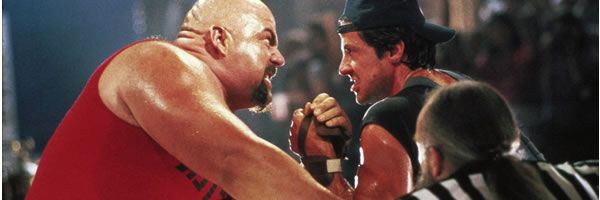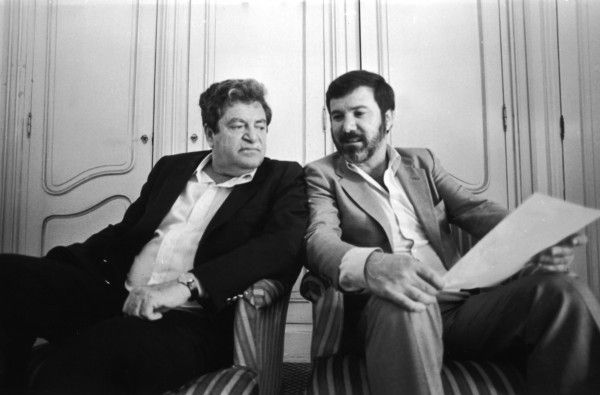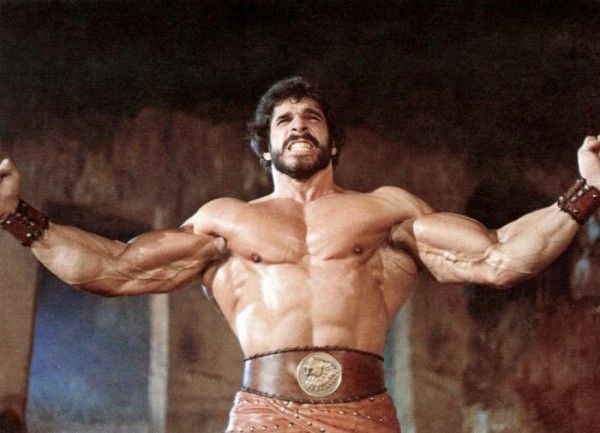I love learning behind-the-scenes stories about movies, and the crazier the movie and the production team behind it, the better. During the 1980s, no major studio was making movies like Cannon, which was run by Israelis Menahem Golan and Yoram Globus. Their schlocky movies have developed a cult following over the years, and although some of it is ironic appreciation, the stories behind those films are fascinating. In his new documentary, Electric Boogaloo: The Wild, Untold Story of Cannon Films, director Mark Hartley regales us with wild anecdotes and clips, and while the structure is a bit scattershot, it’s still an exciting and hilarious look at the madness that went into creating delightfully loony pictures.
After a fast-paced opening that gives viewers a taste of the kind of insane pictures Cannon made, Hartley introduces us to cousins Menaham Golan and Yoram Globus. We learn that Golan was the “creative” one while Globus handled the financial side. Golan was deeply influenced by the Hollywood films he saw as a boy in Israel, and it created a burning desire to make his own movies. Along with Globus, the two mastered the art of the deal in making their cheap knock-offs, and Hartley interviews plenty of fellow employees, actors, directors, writers, and others who worked in their madhouse. Golan and Globus declined to be interviewed, but Hartley repeatedly uses footage from this documentary to let the moguls speak for themselves.
Hartley’s previous two films, Not Quite Hollywood and Machete Maidens Unleashed, also explored exploitation pictures, but their foreign locales offered an exotic quality to the subject matter that made the documentaries highly informative as well as entertaining. Cannon Films are on familiar ground because even if you don’t know the name of the studio, you know Chuck Norris and pictures like Masters of the Universe and Superman IV: The Quest for Peace. Electric Boogaloo offers a comfort level for those who grew up with Cannon’s library of topless women, bloody horror, and lo-rent special effects. For outsiders, Hartley still has stories galore to share.
The documentary lays the groundwork for where Golan and Globus came from, but once “The Cannon Way” is established—“Resembles something minus good taste,” says one talking head—it’s off to the races with some of the studio’s most bizarre pictures. As I was watching, I scribbled down some of the more intriguing titles I now want to see such as Ninja 3: The Domination, which is described as cross between Enter the Ninja, The Exorcist, and a dance picture. There are also movies where we get the sense that the whole film is terrible in a bad way but Hartley has picked the best moment, such as this one from 1983’s Hercules starring Lou Ferrigno.
But once Hartley starts expanding the documentary, it starts to lose shape, and he’s like a kid in a candy store running from sweet to sweet. He still remembers to loop back to Golan and Globus to show their wheeling and dealing at Cannes and their awful ideas when it came to movies. However, the documentary transforms into a cavalcade of stories and remembrances both in general about the studio (at one point, Hartley strings together a litany of insulting adjectives his talking heads have for the Cannon bosses) and on particular pictures. Thankfully, these films continue to reinforce the overall “vision” behind Cannon, which was, to quote one talking head “the intersection of ideas that should never go together.”
Watching the movie, I got the feeling that Hartley has far more stories than a reasonable runtime could hold, and yet it also feels long, partially due to its loose structure as well as the inclusion of some anecdotes outside the bounds of Golan and Globus’ influence. In particular, the documentary spends time on the Indiana Jones rip-off King Solomon’s Mines, and the talking heads devote most of their comments to basically calling Sharon Stone a bitch. Whether your believe that or not, the behavior of actresses isn’t exclusive to Cannon nor was it caused by Cannon as the talking heads say she showed up to set with a bad attitude rather than the studio’s parsimonious ways affecting her mood.
Thankfully, Electric Boogaloo mostly sticks with anecdotes that always link back to Cannon’s unique identity, and it’s filled with stories that may not provide any lessons, but they’re certainly juicy and provide a welcome glance into the minds of two dreamers who made down and dirty pictures that were unabashedly cheesy and have stuck with an audience that loves watching a bear getting thrown into outer space.
Rating: B
Click here for all of our TIFF 2014 coverage. Click on the links below for our other TIFF 2014 reviews:
- Backcountry
- Cub
- The Drop
- Face of an Angel
- Force Majeure
- Foxcatcher
- Haemoo
- The Humbling
- The Imitation Game
- It Follows
- The Look of Silence
- Manglehorn
- Men, Women & Children
- Mr. Turner
- Nightcrawler
- Pawn Sacrifice
- The Reach
- The Riot Club
- The Tale of Princess Kaguya
- This Is Where I Leave You
- The Wanted 18
- Top Five
- Welcome to Me
- What We Do in the Shadows
- While We’re Young
- Whiplash




